This is the second of a series of kitten-related blog posts contributed by Tonya Jensen, SVACA Kitten Foster Mom volunteer, and new SJAA volunteer.
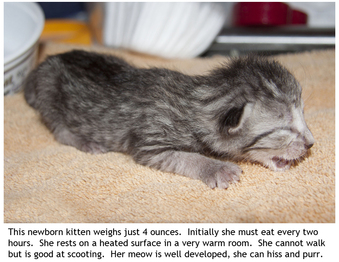
Are you sure? I’d be willing to bet that most foster parents initially exclaimed that they could never be a foster parent and gave reasons such as:
- I’d fall so in love with the kittens I could not give them up.
- Maybe someday but right now I am too busy.
- I have no idea how to foster a tiny kitten.
Such reasoning filled my head until a day early in 2010 when I received a letter from Silicon Valley Animal Control Authority (SVACA) that said:
“In 2009, SVACA staff had no options for 133 underage kittens, which made up 20% of the total cats and kittens who did not receive a second chance at life. Many of these kittens could have been saved if foster parents had been able to provide the necessary in-home care.”
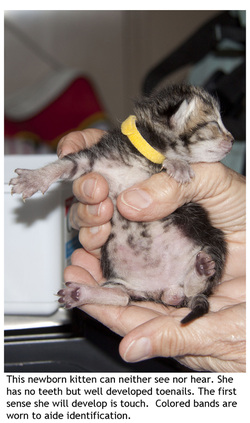
SVACA is just one small shelter in the South San Francisco Bay Area. Imagine, how many kittens euthanized in our community could have been saved if foster families had been available? SVACA alone saved 200+ kittens in 2011 because volunteers stepped up to foster kittens. Rescue groups and shelters are pleading for foster families. Could you share your home with these precious babies?
My husband and I agreed that, even though all we had almost no knowledge about cats/kittens, we had to give fostering a try. Every life is precious and deserves a chance. We filled out the paperwork, attended an orientation and within one day, had our first neo-nate litter of five little kittens. Some days are overwhelming, some moments are quite comical; at times you might be exhausted, yet many moments are pure joy. Nevertheless, because tiny neo-nate kittens are very fragile, there are a few heartbreaking times that otherwise cloud the very special foster experience. Since our first foster experience, we are now always ready to open our home to babies that need special care and are so rewarded when the final outcome is beautiful, well socialized kittens that will bring years of love, joy and memories to their forever families.
I’d Fall So in Love with the Kittens I Could Never Give Them Up!
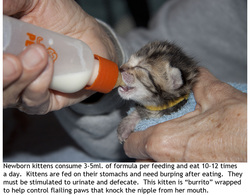
Nothing is closer to the truth than the fact that foster parents bond deeply with their tiny charges, especially those that must be bottle fed every two hours around the clock, helped to urinate and defecate, and kept warm because their tiny bodies cannot regulate heat. Foster care can include non-stop care with bottle feeding, followed by teaching the kittens to use the litter box and eat from a bowl---a rather messy period that generates a considerable amount of laundry at our house.
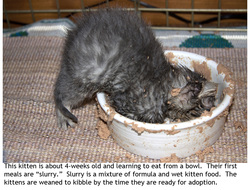
The last few weeks of foster care are the reward period as the kittens are able to take care of their own physical needs. During this time the foster family enjoys the delights of socializing and interacting with the kittens’ in play, and snuggling and cuddling with them to warm everyone’s heart. All too soon it is time to return the kittens for spay/neuter surgery and adoption. (Kittens stay in foster care until they are approximately two months old and weigh at least two pounds, the weight required for spay/neuter surgery. Law in California requires that rescue groups or shelters spay/neuter animals before adoption.) It is very hard to let the babies go and I never do say good-bye without tears and pain in my heart. I allow myself to experience the sadness because it is only personal and minor when compared to the joy the kittens will bring their families and the satisfaction of knowing that they would not be alive without a foster home to sustain them during the early weeks of their lives. Very soon there will be more kittens needing a chance and a foster home to start them on their way. These kittens will soon fill the space in my heart left behind when the previous litter left.
Maybe Someday But Right Now I am Too Busy!
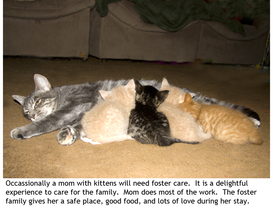
There are different needs and levels of foster care, ranging from tiny kittens weighing only a few ounces that require intense care around the clock for the first one to three/four weeks, to older kittens that are more independent once eating from a bowl and using the litter box. After about four weeks of age, kitten care is greatly minimized, generally requiring only a bowl of food, water, clean litter, clean bedding, occasional medications, and lots of socialization. Some working foster families are able to take kittens to work. Others foster older kittens that are more self-sufficient and therefore they can arrange their family schedule around the kittens’ needs. Families can opt to foster only kittens that are beyond bottles; however, the greatest need is for foster homes for the neo-nate kittens.
I Have No Experience and No Idea How To Foster Kittens!
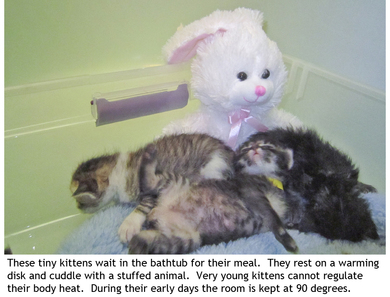
Experience isn’t a pre-requisite for becoming a foster family. Your shelter or rescue group is available to help you learn. Some supplies may come with the kittens to help you get started but it is likely that you will find yourself adding to those to fit your needs. You will need space where you can segregate the kittens from resident cats (cats carry diseases that may not be present in the adult cat but can be transmitted to the kittens and devastate to the young). If you are fostering very young kittens you will need to be able to keep them in a very warm location initially, as very young kittens cannot regulate their body temperature. In some foster homes the kittens spend their early days in the bathroom and more specifically, in the bathtub. You will need a hard-side crate for transporting the kittens. Each agency will handle medical emergencies according to their own policies but there might be times when it will be necessary for you to take a kitten to a veterinarian.
Find Foster Opportunities!

SJAA is partnering with Humane Society Silicon Valley to recruit more kitten foster parents. Read about this local program.
If you live in other areas of the Bay Area, contact your local shelter to find foster opportunities. If they don’t have a foster program themselves, they will be able to direct you to rescue groups in the area that depend on foster families. Rescue groups may have adult cats that need a temporary home too. Adult cats may fill the bill for those that have work hours that make caring for very young kittens difficult.








 RSS Feed
RSS Feed